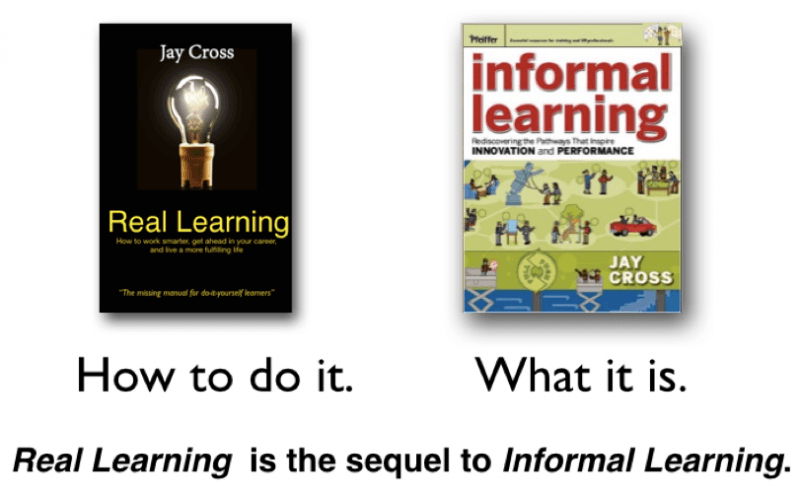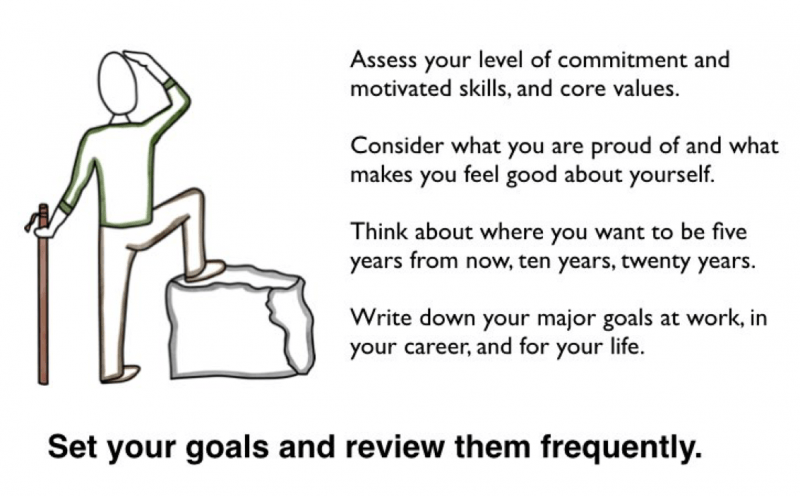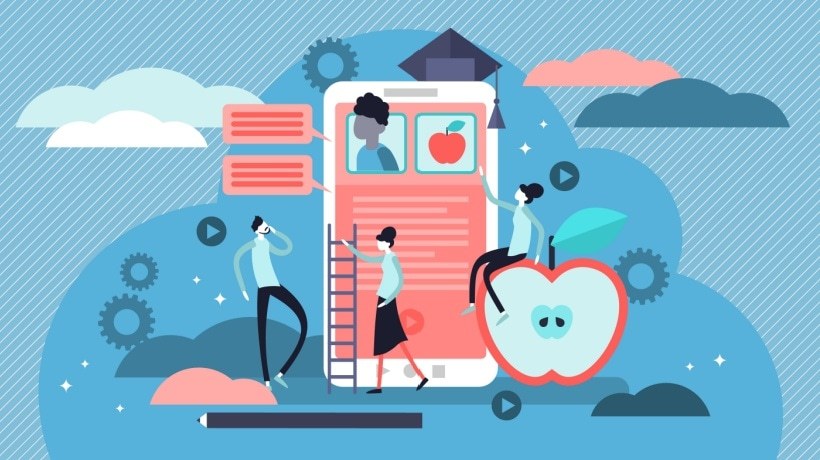Real Learning: How To Implement Informal Learning On Your Own
My previous article tracked the ten year rise of informal learning from obscurity ago to top organizational priority. Managers and executives are embracing the concept of informal learning and its brethren social learning and experiential learning. It’s hip. They believe it’s cheap. It’s already 90% of the way people become proficient at their work.
Management gives lip service to worker autonomy and freedom to choose. They tell the entire workforce they are now responsible for their own learning.
That’s often as far as it goes.
There’s no attempt to transfer the expertise of Instructional Designers and the wisdom of neuroscientists to the people who now need to become their own personal Instructional Designers. This is foolish. We know a lot about how people can improve their learning –it ain’t schooling– and we haven’t shared that knowledge. For shame.
The Real Learning Project
That’s why I created The Real Learning Project: To share what scientists and practitioners know about learning effectively.
My book Informal Learning: Rediscovering the Natural Pathways that Improve Learning and Performance defined informal learning, described its monetary and intangible benefits, offered examples, and provided advice to managers.
My new book, Real Learning: Work smarter, advance your career, and live a better life, gives instructions on how to implement informal learning on your own.
Real Learning Defined
Real Learning is learning as a life skill. It is learning from experience, from other people, from work, from feedback, and from courses and workshops.
Real Learning begins when you Discover a new idea, Assess it for worthiness, Act upon it, Reflect on it, and perhaps share it with others.
Not that the process is that neat. The four steps overlap one another. It’s more like they are being whirled in a blender to create a Real Learning smoothie.
You are learning all the time, taking in new information and making sense of it. Real Learning is rarely schooling. With Real Learning, you learn by doing, through conversations, and from the school of hard knocks. You, rather than a teacher or institution, are in charge of the process.
Learning is something that you own and experience continuously, with other people, in your life and your work. Most Real Learning deals with tacit knowledge, the things you cannot write down.
It is about doing. The knowledge acquired through doing is what separates a professional chef from a home cook following recipes in a cookbook. Tacit knowledge, that is, practical know how, cannot be captured on the pages of any book. It calls for judgments, emotions, and complexities that you only absorb through experience. Tacit knowledge does not simply inform you, it makes you a better person.
The basic difference is that explicit knowledge adds to what you know. Tacit knowledge transforms who you are.
Real Learning focuses on acquiring tacit knowledge from experience and conversation. It accentuates what makes us human. Challenge. Variety. Growth. Relationship-building. Judgment. Complexity. Human skills. This is where value is created. Expanding your experience is the way to get there.
To advance your career, you have to expand your work to include what you want to know and become. Whatever it takes in your organization, get assigned to situations you can learn from. Do not let yourself stagnate. What is good for you and good for them?
Before signing up to learn this way, people need strong motivation. Change is not frivolous. The book begins with self assessment exercises and introduces a means of keeping track of progress. Then you’re asked to write down your goals. (Merely writing your objectives down makes it more likely you’ll shine.)
With personal goals to encourage you to participate, Real Learning provides advice on how to:
- Learn from experience without instructors or classrooms.
- Work smarter and have more impact.
- Learn faster and remember more.
- Embrace openness and learn out loud.
- Make sound learning practices into lifelong habits.
- Co-create knowledge with colleagues.
- Plan how to achieve your growth goals.
- Learn to be the person you aspire to be.
Real Learning provides techniques and the opportunity to practice these:
- Self analysis and goal setting.
- How people learn in organizations.
- Casting your net into the feeds and flow to extract the good stuff.
- How to learn –and demonstrate mastery– with curation.
- Becoming a search ninja.
- Refining your crap detectors.
- Strengthening your memory.
- When to take breaks.
- Sketching things out.
- Conditions/attitudes for optimal learning.
- Seeking new challenges, leaving “FamiliarLand”.
- Taking on stretch assignments.
- Social learning, conversing, making relationship work.
- Participating in a community of practice.
- Reflection – on what’s learned, how it’s learned, and how to improve the process.
- Working out loud.
- Getting feedback.
- Talking business.
- Breaking nasty habits.
- Being mindful.
FamilarLand?
You are the sum of your experiences. Experience has shaped your personality, your habits, your mindset, your values, and your brain’s wiring to make you who you are. It is everything you have learned. I call it FamiliarLand.
FamiliarLand is your comfort zone.
Since you already know everything in FamiliarLand, there is nothing for you to learn there. Learning is a journey from FamiliarLand into Unknown Territory. In Unknown Territory, you will experience new things and link them to what you already know. Learning requires leaving FamiliarLand to try new things.
Often the most practical way to experience Unknown Territory is to take on Stretch Assignments.
First Principles
Naturally, The Real Learning Project has my fingerprints all over it. The book builds on the philosophy I’ve been spouting for years:
While cleaning up my office this afternoon, I came up this list of essentials for effective informal learning I wrote a couple of years ago.
I don’t know if I’m in a rut or simply unwavering in my beliefs, but I was surprised to find that every one of these appears in nearly the same language in my new book. (I’d forgotten that I’d written the earlier list.)
- Most learning is self directed. Give people the freedom to chart their course. Make sure resources are readily available and easy to find.
- Set high expectations, and people live up to them. Help people make sense of and prosper in the world and the workplace. Facilitate social networks that enable people to compare their situation with others.
- Conversations are the stem cells of learning. Foster open, frequent, frank conversations both virtually and in person. Praise courageous conversations.
- People learn by doing. Encourage experimentation.
- Ensure that managers and mentors understand the impact of stretch assignments. Learning is experiential, and stretch assignments give learners new experiences.
- Teach people the least they need know to tackle things on their own.
- Make it drop dead simple to access people in the know, the lessons of experience, how-to information, and performance support.
- Learning is social. Encourage participation in communities. Make collaboration the norm. Narrate your work and share with others. Communities and guilds create and consume knowledge. If you don’t have a vibrant social network, create one.
- More than half of us work part of our time outside of the office. Ensure support is mobile.
- We want what we want, no more. Whenever possible, provide choices. Give employees the pieces to create personalized learning experiences.
- Learning is for everyone, not just novices and up-and-comers. You can’t expect to prosper without it. Make sure everyone’s covered.
- Learning takes reinforcement to stick. Seek feedback. Blog, tweet, and otherwise share your reflections. Revisiting what you learn fixes it in memory.
- Innovation is born of mashing up concepts from different disciplines. Encourage looking outside the box.
- Provide feeds for what’s going on in the team, the department, the company, the industry, and technical disciplines.
- People confuse learning with school. Build lessons on learning how to learn into the organization.
The Real Learning Project is an experiment. Borrowing a page from Lean Strategy, I released a “minimum viable product”, in this case a beta version of the book, into the market to plumb for interest. I handed out review copies and sold the beta version for $2.99. 200 people are reading the book. It’s been revised and improved four times, and we’re still in beta.
Only ten percent of the readers have provided feedback, but what they tell me is encouraging. 21 out of 21 respondents would recommend the book to a friend or colleague. Only half the group has read beyond the first few chapters.
What they like is that Real Learning is:
- Clear, actionable.
- Concise ideas, language, and opportunities.
- Practicality, examples, and simplicity.
- Embodied energy, flexibility, and variety.
- Love that it leads to other learning. Interaction and reflection.
- Lots of great ideas about how to learn and be successful.
- Practical suggestions, encouragement to just do it.
- Authentic, simple to read.
- The self directed concept, the personal learning, the way it was written.
- Very practical, resonates to what I believe real learning is.
- Its human voice.
In the next article, I’ll describe how real learning might be incorporated into the learning culture of an organization.
The print version of Real Learning will be released at Online Educa Berlin in December 2015.
Here is more information about The Real Learning project.













